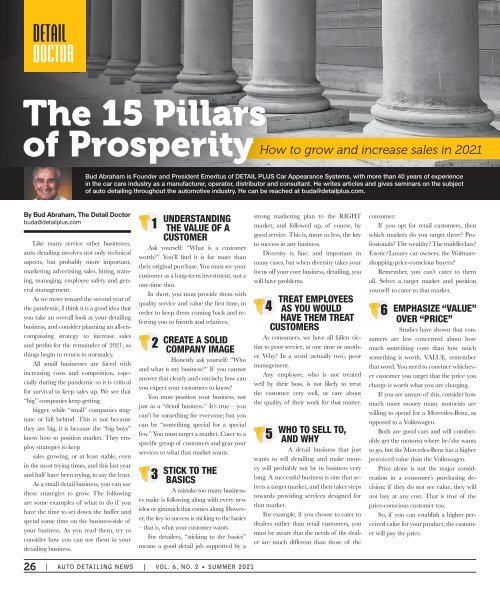2021_ADN_V6_No2-web
Create successful ePaper yourself
Turn your PDF publications into a flip-book with our unique Google optimized e-Paper software.
DETAIL<br />
DOCTOR<br />
The 15 Pillars<br />
of Prosperity<br />
How to grow and increase sales in <strong>2021</strong><br />
Bud Abraham is Founder and President Emeritus of DETAIL PLUS Car Appearance Systems, with more than 40 years of experience<br />
in the car care industry as a manufacturer, operator, distributor and consultant. He writes articles and gives seminars on the subject<br />
of auto detailing throughout the automotive industry. He can be reached at buda@detailplus.com.<br />
By Bud Abraham, The Detail Doctor<br />
buda@detailplus.com<br />
Like many service other businesses,<br />
auto detailing involves not only technical<br />
aspects, but probably more important,<br />
marketing, advertising, sales, hiring, training,<br />
managing, employee safety and general<br />
management.<br />
As we move toward the second year of<br />
the pandemic, I think it is a good idea that<br />
you take an overall look at your detailing<br />
business, and consider planning an all-encompassing<br />
strategy to increase sales<br />
and profits for the remainder of <strong>2021</strong>, as<br />
things begin to return to normalcy.<br />
All small businesses are faced with<br />
increasing costs and competition, especially<br />
during the pandemic so it is critical<br />
for survival to keep sales up. We see that<br />
“big” companies keep getting<br />
bigger, while “small” companies stagnate<br />
or fall behind. This is not because<br />
they are big, it is because the “big boys”<br />
know how to position market. They employ<br />
strategies to keep<br />
sales growing, or at least stable, even<br />
in the most trying times, and this last year<br />
and half have been trying, to say the least.<br />
As a small detail business, you can use<br />
these strategies to grow. The following<br />
are some examples of what to do if you<br />
have the time to set down the buffer and<br />
spend some time on the business-side of<br />
your business. As you read them, try to<br />
consider how you can use them in your<br />
detailing business.<br />
1 UNDERSTANDING<br />
THE VALUE OF A<br />
CUSTOMER<br />
Ask yourself: “What is a customer<br />
worth?” You’ll find it is far more than<br />
their original purchase. You must see your<br />
customer as a long-term investment, not a<br />
one-time shot.<br />
In short, you must provide them with<br />
quality service and value the first time, in<br />
order to keep them coming back and referring<br />
you to friends and relatives.<br />
2<br />
CREATE A SOLID<br />
COMPANY IMAGE<br />
Honestly ask yourself: “Who<br />
and what is my business?” If you cannot<br />
answer that clearly and concisely, how can<br />
you expect your customers to know?<br />
You must position your business, not<br />
just as a “detail business.” It’s true – you<br />
can’t be something for everyone; but you<br />
can be “something special for a special<br />
few.” You must target a market. Cater to a<br />
specific group of customers and gear your<br />
services to what that market wants.<br />
3<br />
STICK TO THE<br />
BASICS<br />
A mistake too many businesses<br />
make is following along with every new<br />
idea or gimmick that comes along. However,<br />
the key to success is sticking to the basics<br />
– that is, what your customer wants.<br />
For detailers, “sticking to the basics”<br />
means a good detail job supported by a<br />
strong marketing plan to the RIGHT<br />
market, and followed up, of course, by<br />
good service. This is, more or less, the key<br />
to success in any business.<br />
Diversity is fine, and important in<br />
many cases, but when diversity takes your<br />
focus off your core business, detailing, you<br />
will have problems.<br />
TREAT EMPLOYEES<br />
AS YOU WOULD<br />
HAVE THEM TREAT<br />
CUSTOMERS<br />
4<br />
As consumers, we have all fallen victim<br />
to poor service, at one time or another.<br />
Why? In a word (actually two), poor<br />
management.<br />
Any employee, who is not treated<br />
well by their boss, is not likely to treat<br />
the customer very well, or care about<br />
the quality of their work for that matter.<br />
5<br />
WHO TO SELL TO,<br />
AND WHY<br />
A detail business that just<br />
wants to sell detailing and make money<br />
will probably not be in business very<br />
long. A successful business is one that selects<br />
a target market, and then takes steps<br />
towards providing services designed for<br />
that market.<br />
For example, if you choose to cater to<br />
dealers rather than retail customers, you<br />
must be aware that the needs of the dealer<br />
are much different than those of the<br />
consumer.<br />
If you opt for retail customers, then<br />
which markets do you target there? Professionals?<br />
The wealthy? The middleclass?<br />
Exotic/Luxury car owners, the Walmartshopping-price-conscious<br />
buyers?<br />
Remember, you can’t cater to them<br />
all. Select a target market and position<br />
yourself to cater to that market.<br />
6<br />
EMPHASIZE “VALUE”<br />
OVER “PRICE”<br />
Studies have shown that consumers<br />
are less concerned about how<br />
much something costs than how much<br />
something is worth. VALUE, remember<br />
that word. You need to convince whichever<br />
customer you target that the price you<br />
charge is worth what you are charging.<br />
If you are unsure of this, consider how<br />
much more money many motorists are<br />
willing to spend for a Mercedes-Benz, as<br />
opposed to a Volkswagen.<br />
Both are good cars and will comfortably<br />
get the motorist where he/she wants<br />
to go, but the Mercedes-Benz has a higher<br />
perceived value than the Volkswagen.<br />
Price alone is not the major consideration<br />
in a consumer’s purchasing decision;<br />
if they do not see value, they will<br />
not buy at any cost. That is true of the<br />
price-conscious customer too.<br />
So, if you can establish a higher perceived<br />
value for your product, the customer<br />
will pay the price.<br />
26 | AUTO DETAILING NEWS | VOL. 6, NO. 2 • SUMMER <strong>2021</strong>

















